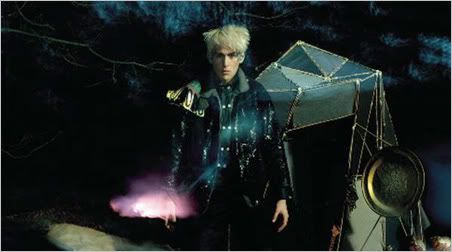
“Vulture”
from the album The Bachelor
2009
iTunes
Leading up to the release of his fourth album, The Bachelor, Patrick Wolf has been treading perilously close to the line that separates a healthy kind of artistic self-indulgence from unchecked egotism. From picking a feud with Mika on his (admittedly hilarious) MySpace blog and announcing a retirement that ended up being shorter than Jay-Z’s, to making claims that he wanted his fans to buy “shares” of his new album, Wolf’s attention-whoring and petulance might overshadow his work were The Bachelor not so brilliant.
Supposedly written during a period of romantic disillusionment, the album filters Wolf’s bitterness through his outsized dramatic flair. Opener “Hard Times” starts off as an homage to Joy Division before exploding into a chorus of jagged strings and sarcastic gospel choirs calling out for revolution. The twitchy, stuttering “Oblivion” and haunting “Theseus” are highlighted by spoken-word passages from actress and fellow kook Tilda Swinton; it’s the kind of stunt that would smack of pretension on almost any other album by almost any other artist, but Swinton’s recitations work in the heady context created by Wolf’s theatricality and his willingness to draw from such a broad spectrum of pop-culture influences.
That Wolf is something of a scavenger is the focus of the album’s phenomenal first single, “Vulture,“ on which collaborator Alec English deconstructs what sounds a lot like Muse’s “Supermassive Black Hole” over some Depeche Mode-style electronic loops while Wolf obliquely recounts the breakdown he suffered on his last tour and yelps about out-of-control forest fires and rotting flesh. His campy affect on the song and throughout its decidedly NSFW video give the single something of an ironic remove, but tracks like “The Sun is Often Out” and “Who Will” find Wolf more emotionally naked and vulnerable.
The Bachelor‘s overall tone reflects a nihilistic view of both romance and humanity, making for an about-face from the relative sunshine of 2007’s The Magic Position, and this tone is reflected in some of Wolf’s most ambitious, baroque compositions to date. While his understanding of pop conventions is always impressive (“Damaris” swells to vertiginous heights in its sweeping, melancholy refrain, and the title track cleverly subverts a ragtime-inspired piano figure), The Bachelor isn’t exactly accessible. But accessibility is incidental to an artist like Wolf and to an album as dense and accomplished as this. The only real complaint about the project is Wolf’s claim to have shelved its supposed companion piece, The Conqueror, though whether Wolf was serious about that is anyone’s guess.


